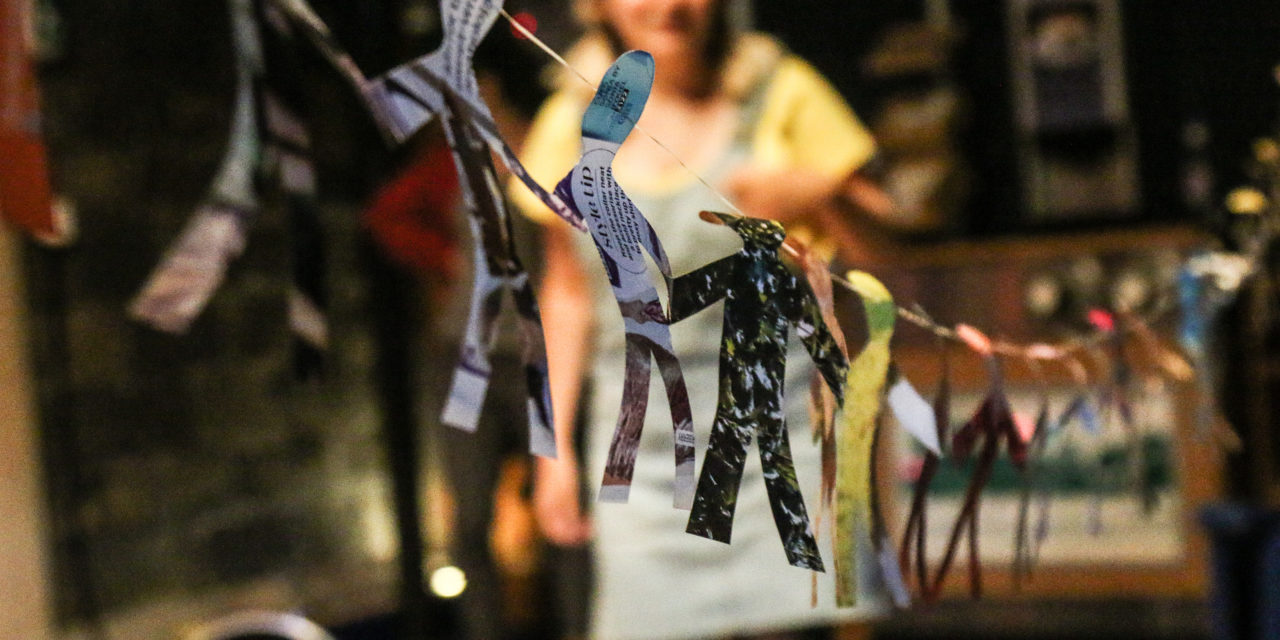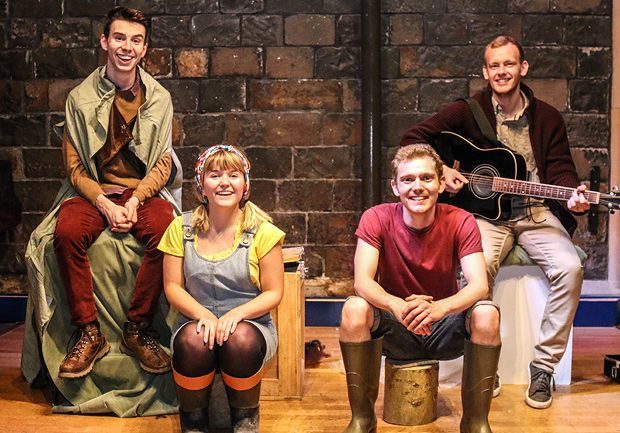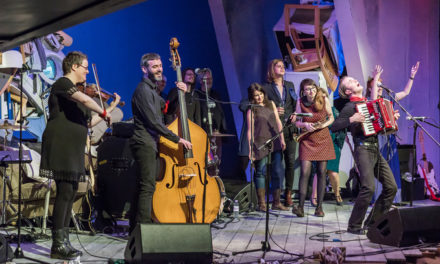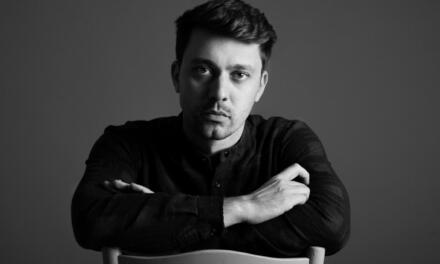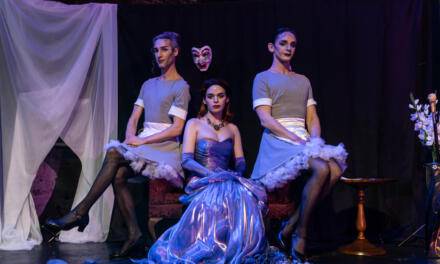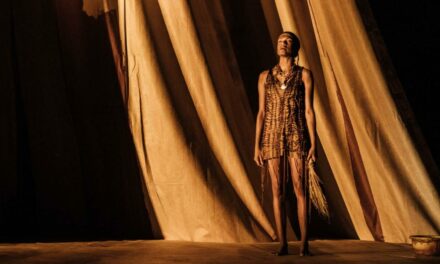A conversation about dramaturgy, storytelling and outside eyes with Shilpa T-Hyland, co-artistic director of Modest Predicament Theatre Company and current masters student at the Royal Conservatoire of Scotland.
Thank you for talking to me about dramaturgy. I’d like to start by asking you about your current artistic practice – what sort of things have you been working on?
Yeah! I feel like it is in a very changing and growing place, mostly because I’m on the masters in “Classical and Contemporary Text” – I’ll give it its full name – but basically because I’m studying directing at RCS at the moment. Because of that, there are various projects – I’d just started a company and I had projects on the go before I got on to the course – so a lot of my work is progressing but in a slightly limbo-period because it has to be developed in my holidays, and that’s an interesting place to be in.
I had just started making work with a company called Modest Predicament, we took our show for families to the Edinburgh Fringe last summer, and we have another show that we’re working on that will be similarly for families.
I’m also working with a playwright called Laurie Motherwell, who is writing a – I’d say less an adaption and more a response – to a 1700’s morality novel by Daniel Dafoe. Laurie is exploding it apart and putting it back together in a different way.
So yeah, I’m progressing with those things, and through the course, I feel I’ve come in with some semblance of a practice and I am now being made to apply that to lots of different things, like directing classical text, or collaborations or working on writers on New Writing.
Sounds very exciting – sounds like you’re doing a lot!
Yeah, the holidays are welcome.
Is dramaturgy a word you are familiar with?
Yes, yeah! It does actually. It feels that. So throughout my undergrad – I did English Literature and Theatre Studies – dramaturgy was kind of like some sort of wild bird that I really wanted to capture, and that I knew was useful, but didn’t somehow, despite the fact it was touched on in many classes. It didn’t seem to get any clearer. I now wonder if that is something to do with it actually having a bit of a hazy definition, and as a role, it can seem pretty hazy too – at least in the UK.
I know, or I feel that dramaturgs are more common in a lot of places that aren’t the UK
For me, it is almost a lens, a critical lens to look at your work through, that compares and contrasts each individual part of the work with each other, and makes sure it fits within the whole of what is meant to be there.
I feel like I always have a certain awareness of it, but at certain points along the process I’ll put my dramaturgs hat on, and say ‘Ok, this character relationship is great but does it make sense within the context of the work?’
I also feel a little bit like, because I’ve been working with classical text for the first time, dramaturgy feels like quite a good voice of reason for a director, in terms of if you’re working with older texts and you come up with a brilliant new concept to frame it, the dramaturgy bit is the bit that says ‘is that a cool idea that doesn’t work, or does that actually fit?’
Does it come up in your studies at RCS too?
It is a word that comes up in RCS, one of my tutors in particular, he is very good at asking questions that you might expect to be asked by a dramaturg – and he often plays that role without necessarily saying it out loud. He’s very good at asking the sort of questions that make you want to unpack everything. I think that’s been really useful. We’ve done a few week-long or two-week-long projects where about halfway through I’ve been made to re-question all the decisions I’ve made. Actually that’s probably fairly representative of the work I make in general, that there’s a mid-point where you reassess everything. It is a good point for me to do the scary point of making completely different decisions to those I’ve already made.
Yeah. I suppose you’ve generated this thing to think about, something to react against, and only then can you ask is this what I’m trying to make.
It sounds like you’re talking about dramaturgy there at a narrative level, about the structure of the piece. Does it work for you on a conceptual level, so if the play is about an overarching metaphor, or even in something more grounded, such as the way it is staged?
Yeah, so it is at that level when I say about directors having brilliant ideas about how they are going to frame a piece. So one example that I did recently was where we were at a point where we could have gone in many directions because the text was very open. But, by changing a decision half-way through, the dramaturgy of the work became a lot clearer. In this instance we decided that everything that happened was in the person’s head. It was a decision we had waivered about before, and had been unclear.
So I think often it is about a thematic thing, or where there is ambiguity in the text. To me that’s where you have to make strong dramaturgical decision, because you have to make everything else stack up with it – and you know it is the wrong decision if you can’t make everything else stack up with it.
I probably encounter dramaturgy in three distinct ways, which relate to the three different types of work that I make.
- So the first one is in devised works, which and very much collaborative – written by everyone involved. In that instance it becomes very much about the narrative structure, and it really is the tool that makes the show come together. We generate lots of material and we sit down with it and use dramaturgy to frame it, and shape it, and curate it.
- Second is New Writing, when I’ve been working with a writer who has written a new piece. They will write something, I’ll look at it, and use dramaturgy as a way to ask difficult questions about elements that might be shaped in different ways.
- The third is working with a text that is pre-existing. Here dramaturgy is about finding a theme or a lens to look at this through, and asking does that lens work.
So for me it fits into those three different places, and of course they overlap.
That’s a really great answer. Picking up on that, I’m interested in who you view as being accountable for having an awareness of the dramaturgy in each of those different strands, whose responsibility is it?
It’s funny because at the moment I am very much learning how to not be accountable for every single job on a project. I’m still so much in that place of working unfunded, and I think it is also a case of just not knowing people who can fulfil certain roles. Certainly there are particular roles that I know few people who can fill them, designers is one of them – I know hardly any designers!
Dramaturgs too – people who actually call themselves dramaturgs. I guess when you don’t have someone fulfilling that role specifically; I do think a lot of that responsibility does fall to the director. When I’m making work collaboratively, I tend to make work that will be written together and discussed a lot, but where ultimately I’m still the director. I’m not an outside eye, but an overseeing eye
Kind of like a sieve?
Yeah. I think in that way the responsibility ultimately falls to the director.
Having outside eyes, though, I think that can be a really good way of getting that dramaturgy-eye into the process. For me, it is the same as writing essays, there comes a point where you can’t see the wood for the trees.
I think that an outside eye is only as useful as the questions you ask of it. Inviting someone in to see a work at a growing point isn’t enough in itself, as a director you still need to be able to ask the questions you want to get the responses you need.
It is interesting to work with writers. I’d be very interested to hear what a writer’s response to some of these questions might be. Dramaturgy is very much a part of writing. There have definitely been conversations between me and a writer about a work, where we’ve been sharing the dramaturgy. We both have a critical eye to each other’s work.
Also at an early stage, the questions you’re asking are sometimes about finding out what speaks to people. I think that’s something that’s not necessarily considered as dramaturgy a lot of the time, but it is certainly part of outside eye-ing.
Are they two roles you’d draw some sort of distinction between then, the dramaturg and the outside eye?
I think part of being an outside eye is taking on some of the responsibilities of a dramaturg, but some of it is also, in a way, a kind of test audience.
They are very very close, but probably slightly separate.
There’s a wider breadth of people I would invite as outside eyes than those I’d invite in specifically as a dramaturg.
My way of thinking is that although people talk about dramaturgs as being detached or distant to a production, that’s absolute rubbish. Dramaturgs are really invested in the work, and in the audience that watch the work. Dramaturgy is really about listening and knowing how a work relates to an audience when it is being performed, thinking about what will and what won’t land. Trying to predict and guess that. Which is hazy, and you will inevitably get it wrong sometimes.
Whereas the outside eye is that audience, that turns up, and looks at it.
Yeah. And I think depending on who you invite as an outside eye – and their experiences – means they will naturally fall into different lines.
Different grooves I guess.
In thinking about how a work relates to its audience. I want to ask you about Erin, Errol and The Earth Creatures. It’s a piece of storytelling. I was quite curious about, considering it is a work for children, about how you told that story differently for that particular audience? Or if there was a dramaturgy of work for young audiences, what might that look like and how you might describe it?
In all these things I feel like I’m still finding my feet, and translating hazy feelings of things I know in the back of my mind but have never sat down to express. Jenny Gilvear is the other half of this company, and she and I co-wrote that piece and co-directed it. One of the biggest questions for us was how do you make a show for young people that isn’t talking down to them? Particularly when you are dealing with issues about recycling and the environment when it contains that sort of educational material? It is very very easy to slide into that ‘And Now We’re Going To Talk About The Environment.’
Making work for that audience is different in a sense – in thinking about what that audience wants from a piece, because they have shorter life experience but not less. It’s just different. I think, what many people who make work for young audiences would say, is that kids are really underrated. The intelligence they have is amazing. A lot of work for young people isn’t challenging enough.
So, for me, it is really important that you have a dramaturgical strand to work for that audience because it should be as rigorously thought through and tested. It should make as much sense as any work for adults.
You end up having a lot of conversations where you try to remember what you could do at certain ages. Sometimes the answer is that well some do and some don’t, but that doesn’t mean we can’t put it in the show. Whereas sometimes you do realise there are certain things a 4-year-old might not get that an 8-year-old will, and maybe there’s a more interesting way to put it for them.
What was the age bracket for your work?
That show was 5+, and I think the oldest we had was about 10.
Do you feel there were different strands operating through the work because of the age differences? I mean the differences between five-year-olds are pretty massive, but the difference between a 5 and a 10-year-old is presumably much bigger. I really enjoyed watching the work, but there were definitely parts that were aimed at older audiences, and some aimed at younger audiences.
I think one of the things we were keen to develop after you saw that work-in-progress showing was that it’s very wordy – the text. For some of the younger members of the audience, it was possibly a bit dense, but there were the visuals of it – it was very full of puppets – and there was music in it too. I think we were quite conscious of getting enough happening on stage. Enough happening that if they weren’t interested – because I think that’s what it comes down to rather than understanding – that you didn’t lose out on the story because it was being represented in other ways.
The great thing about child audiences is that when you show them a preview or a work-in-progress, it is very easy to see which parts of the show don’t work. They either leave, they’ll wander away, they’ll start chatting, or they’ll fall asleep. Whereas the bits that really work, you can feel the attention, you can hear it in the laughter, and they’ll say things out loud.
I imagine those responses must be a real joy of making this work. A room full of children is possibly the best dramaturg, really exciting. This audience that possibly isn’t weighed down by all the politeness rituals that we are, they just walk away. I’d certainly appreciate that if I was making work. If they don’t like it, they just go!
When you are making work for adults you have to either invite people who you know and you can trust, or you have to build in the mechanism of feedback. Because often, if you just show the work, and you chat to people afterwards, the feedback you get is often really nice but not necessarily the useful critical feedback you need to progress the work.
Whereas yeah, I think a lot of young people will just say it.
I don’t know a super massive amount of children’s work, but I’d be interested to know if you agree. Thinking about making work for children, I’d imagine the structure of the work has to be quite porous, flexible, open? Because the kids will join in. It isn’t just about being able to improvise; it’s something more integral, built into the work. An attention to what’s happening? That feels very different to the expectations of an adult audience, which are that they will typically sit in silence, and it can be quite difficult to get them to join in. With kids, it seems the opposite.
I’m interested in how you make enough work that has enough give in it so that you can let the kids into it?
Yeah, definitely. In the work that we make we try to not be too precious about the text sometimes, because if something happens in the middle of the show then something happens in the middle of the show, and you have to have that flexibility to make that work.
We have worked with storytelling as a form for a while now. That tradition of performance really lends itself to being flexible, because it is stories at their most simple, a person in a room telling a story, and it is very responsive to the people in the room you are telling it to.
I really like the tradition in that form, where no matter how many times you tell the story it is different depending on where you tell it, who you tell it to and who tells it. So I think, for me, that is an ethos that feels helpful when making work for this demographic.
I really like the way you describe storytelling there. There’s definitely a trend for people in theatre-making to use the word in quite a tokenistic way, whereas it sounds like for you there’s a very genuine understanding of a tradition?
I’m a story-telling die-hard! It’s my pet interest I suppose. I wrote an English Lit dissertation on the form of fairy tales and the dramaturgy of the folk-tale oral storytelling form. That has coloured a lot of the way I look at theatre in general. It’s also a form I continue to be engaged with and would like to tease open to find its possible application in different parts of the theatre.
Again, I don’t know a super amount about it – but I’m willing to make an idiot of myself – I imagine the stories are fairly set in their structure, there are a set of audience expectations that need to be met. Is it the storyteller’s job to riff on that, or play on it or vary it in some way?
Yeah. There are a lot of tropes and sort of linguistic things. There are lots of specific things as to how stories are told in different places. There was one where the storyteller would frame the beginning of the story as
“I went to a wedding, and I went to get some cake but I never managed to get any cake because this person kept telling me the story, and so here’s the story – because I never got any cake”
So there are very interesting framing devices that sort of set the story in everyday life.
But yeah, it is a lot about the core stories that exist, which then vary depending on the context in which they are told. The performer is at liberty to play with that text and to make it most useful to the place in and people to which it is told.
And is that a tradition you want to keep alive in your work? So, that place does make a difference, it does change if it is performed in Edinburgh or in Glasgow, or in this chair or that chair over there?
I think it is never something I would claim I apply to every single piece of work I make – that would be a BIG CLAIM to make. It is definitely something I’m interested in experimenting in. I did a show a couple of years ago A Stranger Walks Into A Bar, that was performed in six different pubs, and there was a set structure. It was a sort of a storytelling night crossed with a play, but the actors would collect new stories from the audience, after the show was over, and we would work them in as material for the next show in the next place.
So it took a bit of the old venue to the new venue, in a way, which is sort of related, and sort of oppositional, in that it was changing in each place but also bringing a bit of the last place with it is as well.
Carrying it forward, a sense of the nomadic storyteller
I believe in acting and performing that is responsive to the conditions in which it happens – it’s about finding something new every night, which can be very tiny.
Does that tie into why you like making work for young audiences? Because that sort of thing is going to happen in any performance you do for children, you can’t escape it?
Yeah, I think it does. We initially wanted to make a work for young people because we had to teach a class, and I suppose really enjoyed the conversations we had we’ve these 4-11-year-olds so much that we wanted to make work for them.
My most recent favourite TV program is The Secret Life of Three Year Olds. I’d recommend it to anybody, and it is definitely evidence of how complicated life is at three years old. Kids should not be underestimated!
You were saying that during your dramaturgy process you sometimes put on a dramaturgy hat. I’m really interested in what you think are the advantages of you not getting a dramaturg in, but instead being in a position to be able to put on that dramaturgs hat?
Yeah yeah yeah. I have to put my hands up and say, I’ve almost never been in the room with a self-proclaimed dramaturg. I would quite like the luxury of that.
However, I think one of the biggest benefits is that, if it were a separate person, then it is very easy to switch that part of your brain off altogether, and that doesn’t feel conducive to good work.
I think dramaturgy is in many ways the parts of your brain that are bubbling away at every process of making a show, which is only expressed at certain points but is always bubbling away in the background. At a very basic level, I suppose it is the director’s responsibility to always have the piece as a whole in their mind, even if they might be working on something specific. Yeah, somewhere in your mind, that awareness has to be going on – and that, I suppose, is dramaturgy for me.
So, to lose that awareness and that lens, by passing that over to another person would be difficult. That doesn’t mean it wouldn’t be very very useful to have a dramaturg in the room, but that I would always need to have that still in my brain.
Yeah, you’ve got that skill-set already I suppose. In doing this research I’m quite curious about whilst there is quite a lot of writing banging on about how bad the lack of dramaturgs in the UK is, I’m more focused on where people are using dramaturgical skills, and how that is affecting work being made. There’s a massive overlap between the director and the dramaturg. I was speaking to someone else about this – for a forthcoming interview! – she has directed a lot of New Writing and is a sort of dramaturg for an institution as well. Those skills to her though aren’t separable, she’s just deploying them under different names. And I worry how useful these names are anyway.
I mean. Will I get in trouble if I say this? I guess there is an argument you could make that directing is the practical application of instructing or helping, the actors/performers to communicate an idea. The dramaturg is the critical/analytical, people would not like me saying academic
There’s definitely that tint to it
Personally, I think there is a lot of academic research that goes into the work I make, so I don’t think we should shy away from it. But if it was all to go into separate people, one does the practical and one does the critical
I suppose the other thing that’s really useful about a dramaturg being a separate person is that outside element of it. I don’t think they are detached, and they are often not in the room every single day. There’s something very useful about having someone come in at specific stages, and who is able to reassess what they see. In a way that the people who are giving minute adjustments every day can’t really see.
And it gives you a person that comes back, a deadline to work towards.
The word dramaturg is a pretty heavy word; it can really bring down a room. I remember introducing myself as a dramaturg in a workshop at the Tron 100 and it didn’t go down so well, god it was awful, there was lots of grimacing. It’s quite a heavy thing.
Working with a dramaturg, I think a part of that skill is them trying to keep it light, by not being there all the time. They can leave and come back. They also allow people to not think about the dramaturgical stuff for a bit.
As you say, while you’re directing you can get caught up in small details, but that’s a really important part of your process and the process of making work. So you need the ability to switch off that dramaturgical bubbling. Part of dramaturgy is about intervention, disruption and asking questions – but if you do that every week your actors will just leave!
Yeah, and you do, certainly, get steeped in the work. I guess because I brought up research I think that’s another strand where having a dramaturg is possibly useful, whether it is historical or some other context. And again, as an actor or director you can get really steeped in that research, so much knowledge, but sometimes that doesn’t communicate to people outside of your brain. So, I guess in that way a dramaturg a) can put on that hat of someone who hasn’t been in that room every day, and b) bring in other views on that contextual world – that’s that asking difficult questions.
I’m quite attracted to the idea of the dramaturg as an idiot, partly because that’s the way I would quite like to work I think. The dramaturg as being the opposite of this person who is laden with knowledge, but someone who comes into a room with curiousness, asking what it is this? How does this work? Tell me what this does? That is a really productive way to help. Maybe the last thing you want to bring into a rehearsal room is more knowledge?
I think also that a lot of the context you come up with for a piece is really useful for putting on a good performance, but most of it is not interesting – and the audience doesn’t want to know it!
You’ve got to cherry pick it. Some things are important for the audience to know and some are important for the artists to know. Often they won’t overlap.
Definitely, and that’s part of dramaturgy, being able to see what each element is.
You were describing how your practice is being changed and challenged quite a lot during your time at RCS – in what ways?
I had almost exclusively made devised or collaborative work. I had directed one play that was written in the past, and I had done excerpts from classics, but never a whole thing. So part of the interest in this course was to develop that side of my work. Over this first term, we’ve done Chekhov scenes, and worked with some new commissions from playwrights. We’re off to the globe at the start of 2017 and we’ll be directed 15-minute bits of Jacobean plays. Then when we come back I’ll be assistant-directing A Midsummer Night’s Dream.
I have been working on texts very intensively for quite short amounts of time. For me it has been about thinking about how I use the practice I have developed so far to direct this kind of work. From a dramaturgical point of view it has been quite useful. I’ve had to analyse what I actually do in making a piece of work with people, and sort of separate out these different roles within a multi-role position. So if I’m directing Chekhov I have to think about how much of that is me as the director, how much of it is for the actors. I like to think my rooms are still quite collaborative, but that’s a responsibility in of itself – if you open the doors to opinion then you have a responsibility to set up a framework for that to be useful.
There’s nothing worse than a big free-for-all – which inevitably leads to disappointment
Some of that is about having a dramaturgical sense of where the piece is going overall, and just as you would use the text to back up certain decisions you make, you use your dramaturgical sense to back up which opinions or choices your take forward, because it has to fit in.
Would you communicate that to the actors? How open are you about your mechanisms of working?
I’m a question-asker. Which is probably infuriating, you’d have to ask them. I think it is a difficult question. I think I tend to try a lot of things out in the moment, and then I do display mechanisms when it is time to move forward. So I’ll say we’re doing this because this suits our purpose, so let’s work with that for now. I feel like there’s usually an overhanging caveat of ‘but if we need to, we can always change it’.
Lastly, I was thinking about story-telling – and a crossover it might have with this conversation about dramaturgy. Is that it seems to me that story-telling isn’t about the stories themselves, but about the manner in which they are told. I think dramaturgy as a thing is generally more concerned with not what the play is about, but how the play is working. Story-telling, because it is this oral shared practice, passed down over years, means that the stories change so much because the content isn’t that important. What’s more important is the act of telling it, in that room, to these people. Maybe?
There’s definitely something interesting about, or something useful in the idea that the crux of these stories have been in place for such a long time and they are free to change with changing times, but also that there’s an enjoyment or an appreciation for the art of performance because we already know the story, a lot of the time. The enjoyment comes from the skill of people telling it. So yeah, I think that does connect well with dramaturgy because dramaturgy is really about the skill of communicating that story from the stage to the audience.
This article was originally posted as part of talking dramaturgy, a research project into dramaturgical practice in Scotland.
This post was written by the author in their personal capacity.The opinions expressed in this article are the author’s own and do not reflect the view of The Theatre Times, their staff or collaborators.
This post was written by Andrew Edwards.
The views expressed here belong to the author and do not necessarily reflect our views and opinions.

